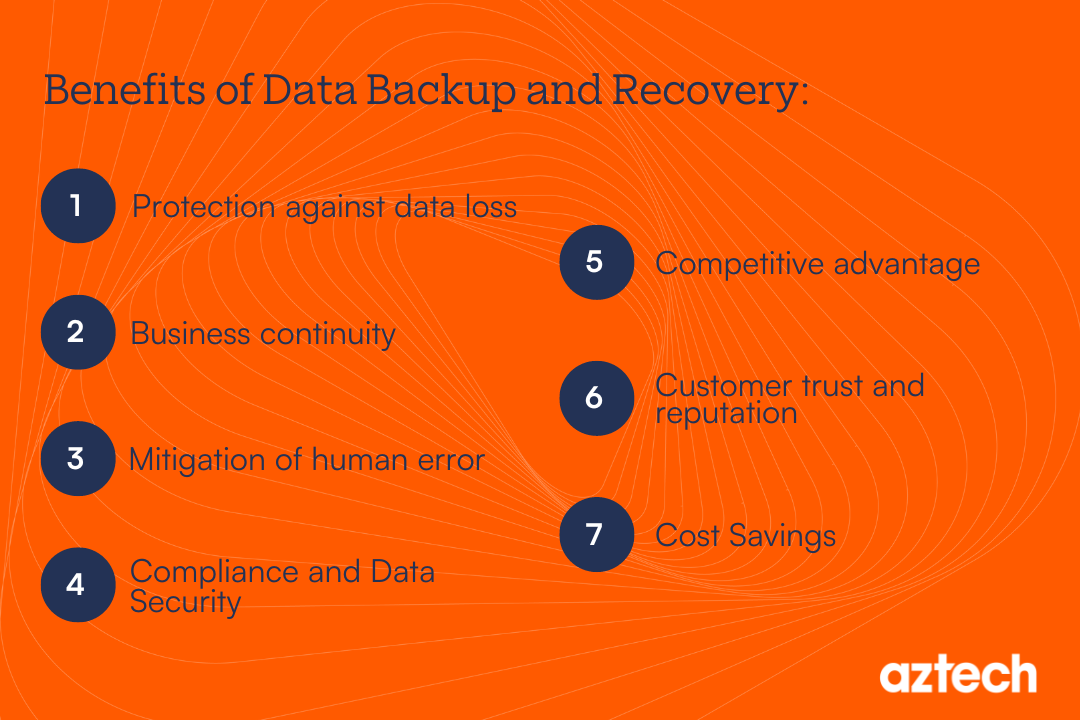Are you aware of the importance of data backups and recovery? Well today, where critical business information is stored on computers and servers, keeping your data safe is more important than ever.
But what if something unexpected happens? What if your system crashes or your files get corrupted? That's where data backup and disaster recovery come in.
The importance of data backup and recovery are protection against data loss, business continuity, mitigation of user error, compliance and data security, an advantage over competitors, customer trust and reputation and saving time and money.
As per the IBM Security Report 2023, the average cost of data breaches for UK businesses is £3.4 million. The UK industries with the highest average cost of data breaches were financial services (£5.3 million), services (£5.2 million) and technology (£4.9 million).
In this blog post, we'll take a closer look at data backup and its components and why data backup and recovery are so important.
What is Data Backup?
In simple terms, data backup is a proactive approach to preserving digital data by creating duplicate copies of business-critical data and important files.
In addition, this process of creating and storing copies, known as backups, protects against potential threats due to various factors such as hardware failure, software glitches, human error, malicious attacks, power outages, power surges, file corruption, virus attacks or even natural disasters.
Here's a closer look at the components of data backup:
Duplication of Data
During the backup process, all essential digital files, documents, databases, and other types of information are duplicated to create a secondary copy. This ensures that even if the main data is compromised or inaccessible, a backup version is readily available for recovery.
Separate Storage types
To minimise the risk of loss, collected data is stored in a remote location separate from the primary data source. This separation prevents single-point failures from affecting both the original and backup copies simultaneously.
The backup data is stored separately from the original data, often on your desktop or laptop computer, cloud storage, external hard drive or removable media.
Common storage options include cloud storage platforms (Google Drive, Microsoft OneDrive, iCloud, Dropbox and others), USB stick and external hard drives, network-attached storage (NAS) devices, and offsite location or data centres.
Regular Updates
Backups are not a one-time event but an ongoing process. Regularly scheduled backups ensure that any changes or additions to the original data stored are reflected in the backup copies.
This practice, often automated through backup software, maintains synchronisation between the primary and backup data sets.
Retention Policies
Backup strategies may include retention policies dictating how long backup copies are retained. Depending on the organisation's needs and compliance requirements, backups may be kept for days, weeks, months, or even years.
Proper management of retention policies ensures efficient use of storage resources while meeting data recovery objectives.
Security Measures
To safeguard against unauthorised access or tampering, data should be protected with robust security measures.
Encryption techniques can be applied to ensure that copies remain confidential, and integrity checks verify the authenticity of stored data.
For example, if you store data in the cloud, you can access it from your computer or mobile device with a secured internet connection.
Importance of Data Backup and Recovery

Here are 7 compelling reasons why data backup is important for organisations:
1. Protection Against Data Loss
Data loss can arise from a variety of factors, including hardware malfunctions, software errors, power interruptions, user mistakes, or cyber-attacks.
Without a proper data backup, organisations risk losing critical information essential for day-to-day operations.
Whether it's customer databases, financial records, or intellectual property, losing this data can have severe consequences.
By regularly backing up your data, you can create a safety net, ensuring that even in the event of loss, they can quickly restore and resume normal operations.
2. Business Continuity
When a disaster strikes, whether it's a system crash, a ransomware attack, or even natural disasters like fire or flood, downtime can be devastating for businesses.
Without access to crucial data and systems, operations grind to a halt, leading to financial losses and damage to reputation.
A robust data backup recovery plan is essential for minimising downtime and ensuring continuity.
With backup copies readily available, organisations can easily restore systems and data, reducing the impact of disruptions and maintaining customer trust.
3. Mitigation of Human Errors
Despite the backup best practices and training, human error is inevitable. From accidental deletion to inadvertent data overwrites, mistakes can happen at any time.
However, by properly storing backup files in place, organisations can mitigate the impact of such errors. The Backup file acts as a safety net, allowing for the retrieval of lost or corrupted data, minimising disruptions, and preventing potential loss.
4. Compliance and Data Security
In today's regulatory environment, protecting sensitive data is paramount. Many industries are subject to stringent regulations governing data protection and privacy, such as GDPR, HIPAA, or PCI DSS.
Non-compliance with these regulations may lead to substantial financial penalties and harm to your organisation's reputation.
Implementing robust recovery measures not only helps organisations comply with regulatory requirements but also enhances overall data security.
By encrypting backup data and implementing access controls, organisations can safeguard sensitive information and prevent unauthorised access or data breaches.
5. Competitive Advantage
In a competitive business landscape, data-driven decision-making is crucial for gaining insights, identifying trends, and staying ahead of the curve.
Organisations that can access and analyse their data effectively have a significant competitive advantage.
By ensuring the availability and integrity of important data through regular backups, organisations can make informed decisions, identify growth opportunities, and innovate with confidence.
6. Customer Trust and Reputation
Customers trust organisations with their sensitive information, whether it's personal data, financial records, or intellectual property. A data breach or loss can damage the organisation's reputation.
Having reliable data backups and recovery mechanisms in place demonstrates a commitment to protecting customer data, enhancing trust, and safeguarding the organisation's reputation.
7. Cost Savings
While investing in data backup and recovery solutions may seem like an additional expense, the cost of data loss or downtime can far outweigh the investment.
Recovering lost data can be time-consuming and expensive, especially if it requires forensic analysis or legal action.
By proactively backing up data and having efficient recovery processes in place, organisations can save time and money in the long run.
Why Choose Aztech for Backup and Recovery Services?
When it comes to backup and recovery, partnering with a trusted IT solutions provider is essential. Aztech offers comprehensive backup services tailored to the unique needs of businesses.
Here's why you should consider Aztech:
-
Expertise: With years of experience in data management and IT support, Aztech's team of experts understands the intricacies of backup and recovery processes, ensuring reliable and efficient solutions.
-
Advanced Technologies: Aztech leverages cutting-edge backup solutions and cloud-based platforms like Microsoft OneDrive to securely store or restore deleted files. From continuous data protection to remote backups, they offer a range of options to suit your requirements.
-
Customised Approach: Recognising that every business is unique, Aztech works closely with clients to develop tailored backup and recovery plans that align with their goals and budget constraints.
-
24/7 Support: In the event of a data loss emergency, Aztech's dedicated support team is available round-the-clock to assist and ensure a quick recovery.
-
Affordable Pricing: Aztech offers competitive pricing packages, including monthly fee options, making data backup and disaster recovery services accessible to businesses of all sizes.
Round Up
In conclusion, backups are not just a precautionary measure; they are a fundamental aspect of data security and business continuity.
By implementing robust backup solutions like online backups or cloud storage which can automatically create backups, businesses can protect their important data, mitigate risks, and maintain operations even in the face of difficulty.
With Aztech as your partner, you can rest assured knowing that your data is in safe hands, allowing you to focus on what matters most—driving your business forward.
Remember, when it comes to data, it's not a matter of if a disaster will strike, but when. So, you should understand the importance of data backups and recovery and protect your business's critical data before it strikes.

-1.png?width=552&height=678&name=text-image%20module%20desktop%20(4)-1.png)


.png?width=2000&name=Case%20study%20(21).png)


-2.png?width=422&height=591&name=text%20image%20tablet%20(31)-2.png)







